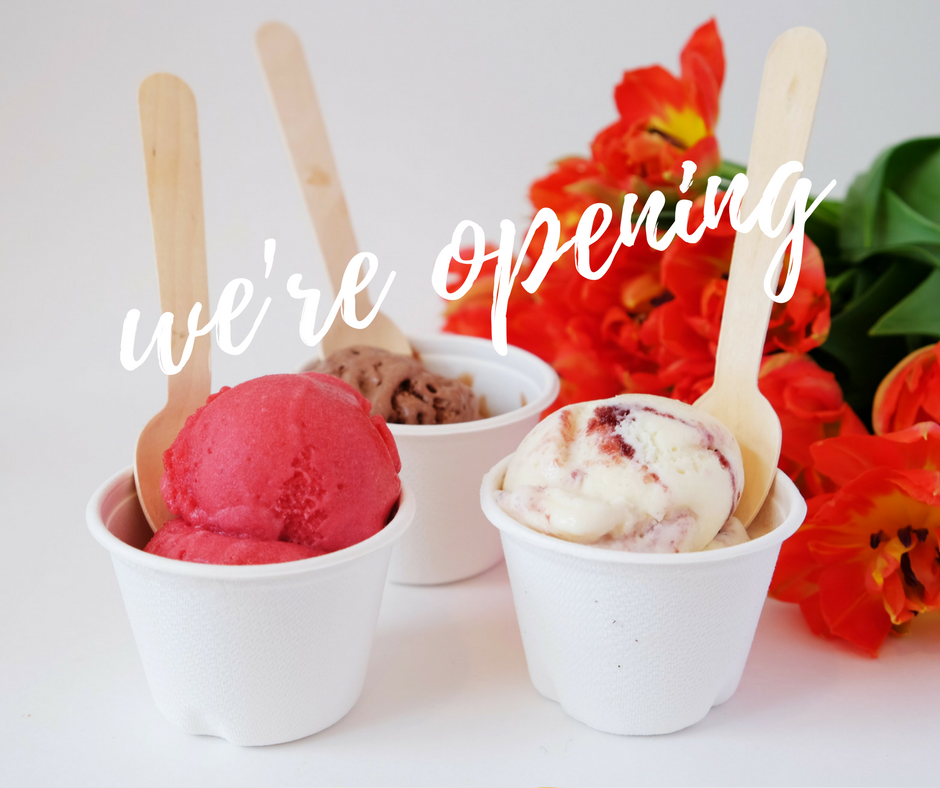Supplier Series: Nith Valley Apiaries
"Apiaries come from Apiarium, Latin for beehouse", says Erika from Nith Valley Apiaries in New Hamburg. Four All Ice Cream has partnered with the local Apiary to incorporate into our ice cream this season. We are so excited for the partnership and want to share with you what makes them unique:
How long has Nith Valley Apiaries been running? Is it a generational business?
"A man named Harvey Gampp began the business in 1918. Over the last 99 years the business has been passed along from old beekeeper to apprentice beekeeper, however, the generations are not all related. Alfred Beam owned the business after Harvey and then it was passed to Alfred’s daughter and son-in-law, Harriet and Allan Bankert. Mike (the current beekeeper) apprenticed with the previous beekeeper, Allan, who helped mentor Mike for several years after Mike purchased the business and then retired. Mike was the sole proprietor for several years before he met and married Erika, who is now an integral part of the business."

How many bees are making your honey?
"We usually manage between 300-400 hives. A beehive’s population varies throughout the year, with its highest population being around 80,000 honeybees in the summer honey-producing months. If we use our lowest number of hives, that would be an estimated 24,000,000 honeybees.
A more interesting fact would be how much honey one bee produces in its lifespan. The lifecycle of a bee is 35-45 days long during the busy summer honey producing months, and of those days, worker bees only work as foragers (collecting nectar and pollen) for the last 22-45 days. The earlier part of a worker’s life is tasks such as feeding larvae, producing wax, and guarding the hive entrance. In the 22-45 days that a worker bee forages, the average honey production per bee is 1/10th of a teaspoon of honey. Thus it takes many, many bees to make enough honey to fill a single jar!"
What does an average day of work look like for you?
"An average day of work is very dependent on the time of the year and the weather. Honeybees are not happy campers when it is rainy because they cannot fly with wet wings, so we try to plan with the weather to visit hives on sunny days and avoid it on cloudy gray days and rainy days. Rainy and cloudy days are used for equipment maintenance and honey extracting, depending on the time of the season.
In the spring, the beekeeper is out checking hives to see how they have over-wintered, finishing off any equipment preparations for the summer honey season, and generally getting ready for the busy season.
Summer is the busy season, and average days are spent outside visiting hives, checking for swarm cells, hive health, and bringing in honey. Rainy days are often used for honey extraction.
Fall is the season of final honey extraction and winter preparations. This includes checking hives for health, ensuring they have enough food for the winter, putting on winter covers, and battening down the hatches, so to speak!
Winter then becomes the time of relaxing as well as maintenance of equipment and reading up on industry news and learning new things about the bees."
What is one thing people should know about honeybees?
"Honeybees are not nearly as likely to sting as you may think. They just want to get to a flower with nectar and pollen, and if you’ve got one hanging around you, it’s not because it wants to come sting you. Consider whether you’re wearing a floral perfume or a strongly scented cologne; you may be a confusing source of scent to the honeybee. In addition, swatting at a honeybee is more likely to result in a sting because the bee becomes alarmed. Instead, try walking calmly away.
Another thing we think people should know is that there are many other types of bees that are important pollinators, but they don’t produce honey that humans can harvest so they largely get forgotten in much of mainstream media’s coverage. Try to learn more about these bees!"
How is Nith Valley Apiaries honey different from conventional honey?
"By conventional honey, we will assume that you mean a pasteurized name-brand honey. Most name-brand honeys are blends of honey from across North America, and occasionally include Argentinian honey and other international honey sources. Sometimes this information can only be found in tiny print on the back of the container. In addition, depending on the name-brand the honey is likely filtered and pasteurized. Filtration removes all pollen particles from the honey, and pasteurization denatures the healthy enzymes found in natural honey. Therefore, there are three big differences between our honey and a name-brand, pasteurized honey:
- Our honey is unpasteurized, and therefore contains the healthy enzymes that make honey a healthier sweetener than sugar.
- Our honey is strained rather than filtered. Straining removes large pieces of wax and pollen but allows tiny pollen particles to remain in the honey, making it valuable for use in reducing seasonal allergy reactions.
- Our honey is local to Perth and Waterloo regions, thus increasing the health benefits with regards to allergy reduction. Generally, the local sources also mean that the honey maintains a stronger flavour profile than a name-brand, blended honey.
The last important difference between a conventional honey and our honey is that we keep our bees using organic practices; however, due to other farmers practices, we are unable to certify."
What is your favourite ice cream flavour?
"This is a tough question! Mike is a fan of maple walnut, while Erika is having a hard time deciding between lemon, cappuccino, and chocolate."
What are you looking forward to with a partnership with Four All Ice Cream?
"We are looking forward to seeing all of the ways that honey can be incorporated into creative flavour pairings for ice cream treats, and building our brands together as Four All introduces delicious new products to their customers. We also look forward to taking a break from our busy honey season this summer to visit Four All and taste it for ourselves!"
Read more about Nith Valley Apiaries on their website, see more on their Instagram and visit their Facebook page. They will be hosting their annual honey tasting on July 22nd, from 9am to 2pm.






